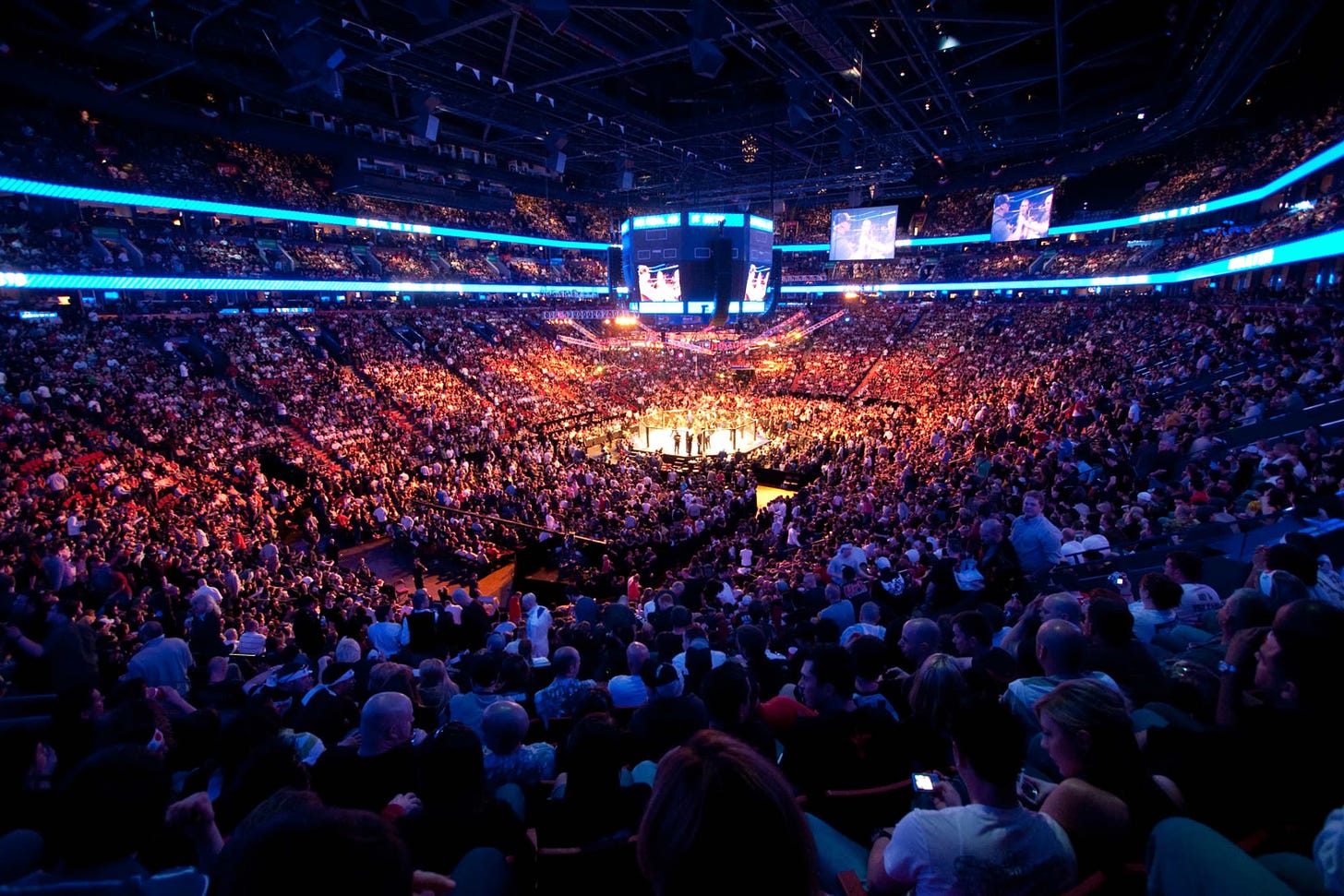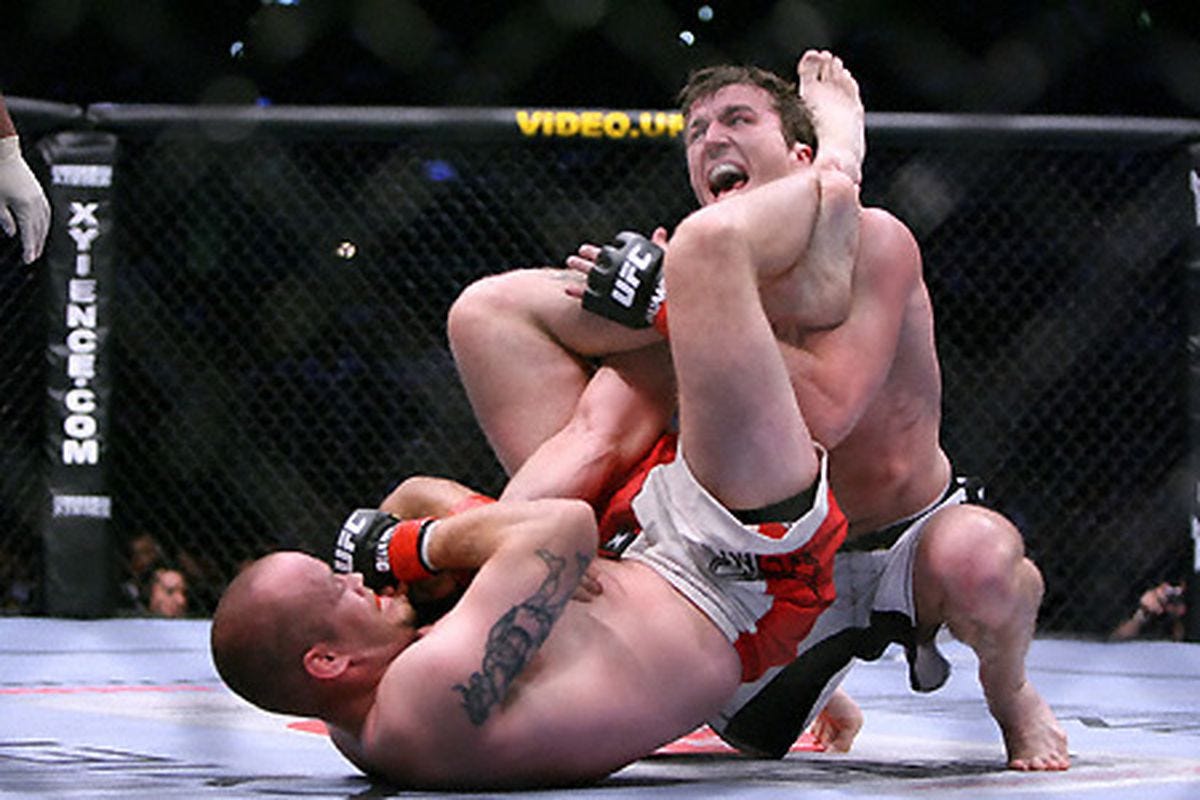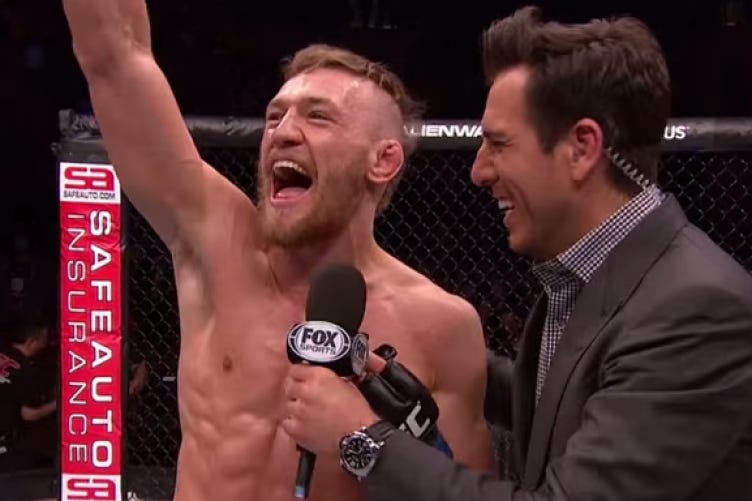I Used to Love UFC: What the Hell Happened?
The Promotion is Still Raking in the Money. So Why Does it Feel So Dead?
Twice in the past week I’ve had readers who, like me, were once obsessed with the Ultimate Fighting Championship and the mixing of the martial arts, reach out with a very basic observation.
UFC is a constant presence on ESPN, ESPN+ and on pay-per-view. Last year, the promotion ran 43 shows, not including bouts televised as part of The Ultimate Fighter reality show (yes, that’s still a thing). To put it into context, it took nine years for the group to run their first 43 events. They do it now every 12 months, even in the face of a worldwide pandemic.
And UFC is not alone.
Bellator has a regular spot in the Showtime rotation, providing a welcome refuge and retirement plan for some of the sport’s fading stars. The PFL is out there doing its thing (whatever that is) on national cable television, making millionaires of random, unestablished fighters.
Once the entire community fought and scrapped for cage fighting’s very survival, keeping it alive on a grassroots level through sheer will and a subscription to Full Contact Fighter, battling politicians and clueless cable executives, evangelizing and sharing this thing we loved with anyone who would listen.
Today, the arguments are centered around how best to officiate and judge the bouts and how the billions should flow through the sport’s eco-system. Whether the enterprise should even exist at all is hardly in question. Fighter names are dropped in rap lyrics, the YouTube stars are threatening to give it a go and even movie fight scenes are finally evolving to include real, battle-tested techniques. MMA is so established, fighters are sometimes invited to the White House, like a championship women’s volleyball team or K-Street lobbyist. Hell, the last President was a former promoter for God’s sake.
It’s, at this point, a sport fairly firmly entrenched in the athletic mainstream. Professional bloviators like Stephen A. Smith even share ignorant opinions about it on a routine basis, the surest sign of commercial and cultural penetration I can think of. Twenty years ago, when we were fearing the UFC would close up shop and call it a day before every show, this was the dream. Now, like George W. Bush on the deck of the USS Abraham Lincoln, it’s time to unfurl a victory banner. We did it! The war with the scolds, the prudes and the righteous was won.
So why, many long-time fans wonder, can they not be bothered to care?
Reminiscing about sports is tricky business. Any conversation that begins with “back in my day” runs the risk of talking about and viewing the past through the rosiest of rose-colored glasses. Certainly, the sport in its glory days was far from perfect.
The fighters back then, as you might expect of someone who volunteered, sight unseen, to fight another of the world’s toughest men in a cage for a millionaire’s pocket change, were rough around the edges. The matchmaking was often questionable, as were some of the athletes. Boxing fans often criticize stars of fighting “cab drivers” instead of appropriate, professional competition. In MMA’s not too distant past, almost every fighter was a working man first and foremost, with only a handful able to compete for a living.
Frankly, perhaps as a result, many of the competitors weren’t actually very good at fighting, their years of martial training proven worthless in the face of live rounds being fired their way instead of bricks and boards just waiting patiently for their death touch. Today’s fighters are demonstrably better at mixed martial arts. For the most part, everyone understands what their opponent is doing, everyone has some aptitude in most areas of martial combat and everyone is in-shape and prepared to test themselves in a game of very high stakes physical chess.
So, again, why don’t we care?
The truth is, UFC has grown too big to fail. The money, even from pay-per-view, is guaranteed. ESPN was willing to deliver it in huge quantities in order to have a captured audience of the promotion’s diehard fans as guinea pigs to bolster their new streaming service. UFC doesn’t have to build stars or sell fans on the fights. They come pre-sold. The violence itself is the draw, not the individual athletes. People, with a handful of exceptions, tune in to see random, muscley avatars hit and kick each other. They tune in to see someone’s lights turned out or their limbs twisted in grotesque mockery of basic anatomy. Whether they recognize the victim’s face, it seems, is hardly relevant.
Once, we knew every fighter on a UFC pay-per-view card. The champions were etched into eternity, names early fans will never forget. The rise of The Ultimate Fighter humanized what could easily be seen as the other, making legends of fighters like Forrest Griffin, Diego Sanchez and Michael Bisping. We feel like we know those guys. They weren’t faceless automatons. They were just dudes. Sometimes weird dudes, granted, but real flesh and blood people. That was the strength of the promotion’s presentation. And, ultimately, its weakness.
Today’s UFC isn’t a collection of star fighters. It’s three letters. That’s what they’re selling and that’s what you’ve agreed to accept by streaming ESPN into your living room. And, you know what? It’s smart.
Athletes are unpredictable. With success, quite often, comes problems, whether its Conor McGregor’s unhinged criminality or Ronda Rousey losing her smile. Even, in the best case scenario, a fighter’s prowess fades quickly. As one coach told me, by the time the mainstream audience knows a fighter’s name, they are probably already a diminishing force. The sport requires peak performance, mentally and physically, as the differences between a knockout punch and a harmless whiff are measured in centimeters and instants. Few can maintain that level of aptitude for long.
Old fans were obsessed with a sport that centered around people. It was also a sport of pioneers and scientists. If you watched UFC in its earliest form, you watched the martial arts themselves change before your very eyes. What worked in a “real fight” changed at startling speed, as human beings tested theories and challenged orthodoxies in the petri dish known as the Octagon.
Today, that spirit of exploration barely exists.
While some talk endlessly about MMA’s “meta game” and minute changes that may give certain people a minuscule edge, the truth is, the sport has essentially settled on a final form. MMA was, as the title suggests, once the mixing of disparate martial arts. Today, it’s an established form of its own, with standardized techniques, strategies and thinking. Winning a fight is about who has better execution, athleticism and discipline, not who has better ideas.
That’s a big change.
MMA has morphed in fairly fundamental ways. Whether it’s better or worse is in the eye of the beholder. I find myself vacillating on this point regularly.
When a modern fighter reaches peak form, there’s really nothing quite like it. The displays of mastery we see in the cage are often truly awe inspiring. But, at its worst, the modern sport can also be dreadfully dull, a collection of Bluth brothers who know exactly what the other guy is going to do, battling listlessly and carefully to win on the ever questionable scorecards. It can feel lifeless, like watching two robots stripped of both body fat and personality, programmed exclusively to punch, kick and ask Dana for 60 G’s when it’s all over.
Considering these kinds of fundamental changes, it shouldn’t be a surprise that the sport doesn’t speak to some of us the same way it used to, especially if we’ve been on this journey for decades. At its core, it’s not the same thing we fell in love with. It’s just not. Nor should it be. Life is change. Why should sports be immune to that truism?
People newer to it may not feel these subtle shifts quite as deeply as us old heads. Hell, they may have happened before some of you started watching. This may actually be the sport you fell in love with. To you, these are the ramblings of a madman and a fool. And that’s okay too.







UFC's brand-over-fighter nonsense was always gonna end up like this. Folks like us tried to warn everyone and the brand loyalists simply won out.
Now it's this sterile, bland thing that I feel morally obligated to ignore. We've seen what happens to early generation fighters when they reach the end of their careers and how easily they're discarded after sacrificing their brain matter for everyone's entertainment. The company refusing to compensate fighters fairly, top level fighters turning their nose up at the idea of organizing because it wouldn't benefit them personally, the embedding of deep, fascist roots into gyms and everything else makes the sport wholly unpalatable.
Still not too late to save this thing..bring in Vince Russo..stop pretending these fights are all shoots..generate some storylines to make me care why I should spare a fraction of a f*ck for either fighter in the cage.
😆